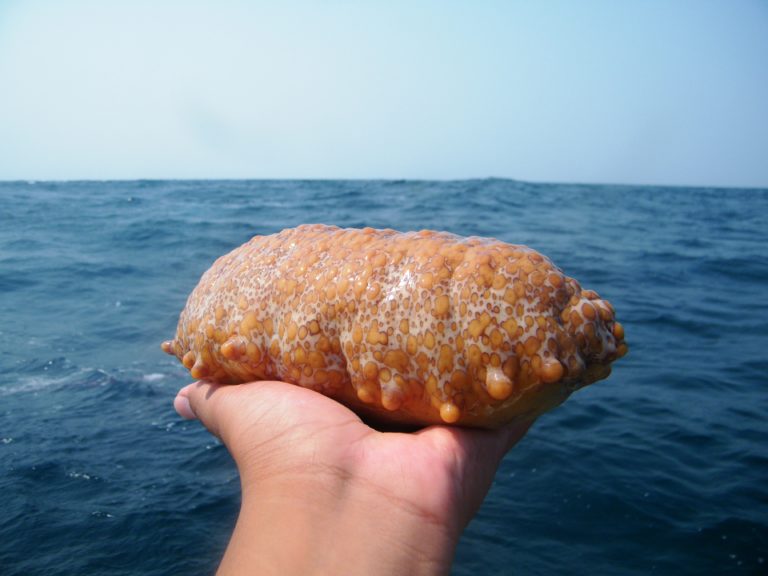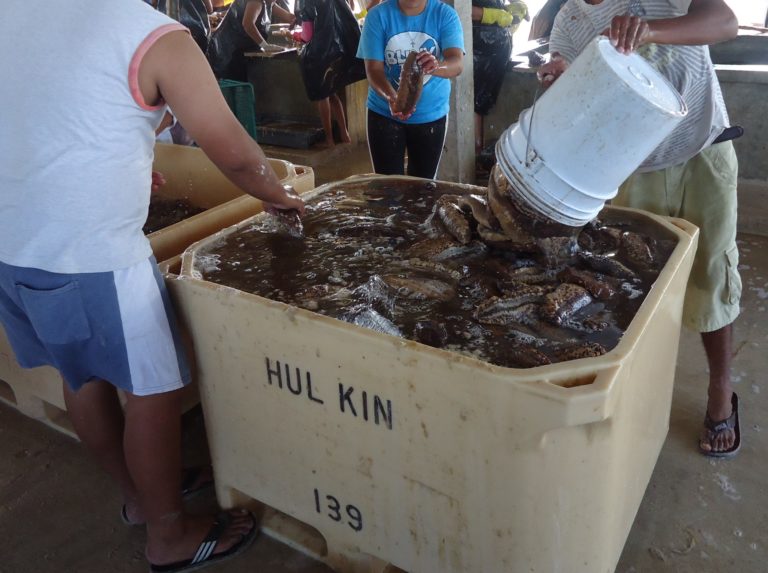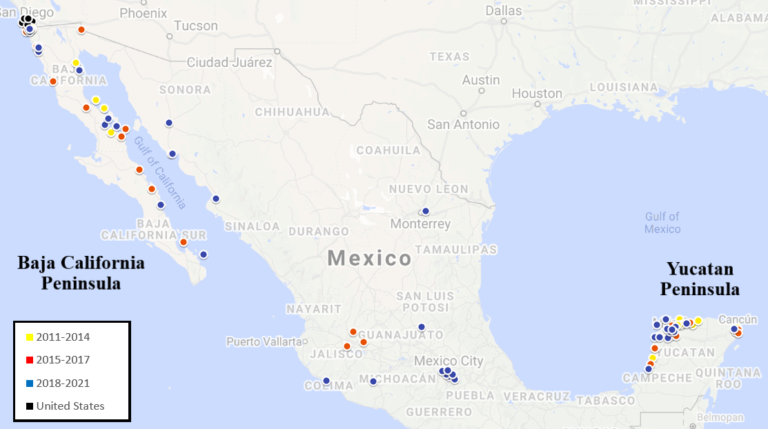Study: Sea Cucumber Crime in Mexico - Destroying Ecosystems and Communities

A global drama that underscores the violence, financial destruction and ecological decimation that can be wrought by organized crime swirls around a rotund bottom-dwelling marine animal – the sea cucumber.
The recent collapse of once-thriving Mexican sea cucumber populations due to poaching underscores the urgency of a new study that outlines the damage that can come to wildlife and people when crime engulfs international trade.
“Illegal sea cucumber fishing has a devastating impact on populations of this important marine invertebrate, undermining conservation efforts,” said Teale N. Phelps Bondaroff, lead author of the paper in Beche-de-mer Information Bulletin and director of OceansAsia. “Illegal fishing undermines conservation efforts, destroys wildlife populations and ecosystems, hurts legal fishers, robs potential tax dollars from governments, undermines good governance and social order, and fuels organized crime.”
The international team of researchers, led by our Director of Research, Teale Phelps Bondaroff, examined media coverage of sea cucumber smuggling and poaching in Mexico from 2011 to 2021. Over this period, they identified 97 incidents, over 100.6 metric tonnes of sea cucumbers were seized by Mexican and U.S. authorities, with an estimated value of $29.55 million.
Given the clandestine nature of wildlife crime, we were only to study incidents that were detected by the authorities. Meaning that our data likely represents only a fraction of the sea cucumber wildlife crime taking place,” said Felix Morrow, OceansAsia Researcher.
The study mapped out incidents and examined reports to better understand the modus operandi of those who engage in sea cucumber crime. It identified a number of key practices among criminals, including mis-labelling, misreporting, stockpiling and invoice manipulation, and fraud as means of laundering illicit catches. The researchers also documented corruption and an alarming number of incidents involving violence, often armed violence.

Co-author Abigail Bennett, an assistant professor in Michigan State University’s (MSU) Center for Systems Integration and Sustainability, has been working with fishing communities in Mexico’s Yucatan Peninsula, bearing witness to the hardship and peril that comes when a wildlife species falls prey to criminal activity.
“Mexico has a long history of robust fisheries science and management coupled with strong community-level organization in the fisheries sector. Unfortunately, the social and environmental degradation from sea cucumber crime has been eroding some of this capacity, especially among small-scale fishing communities,” said Abigail Bennett, assistant professor of fisheries and wildlife at MSU. “For example, in Yucatan, the sea cucumber fishery collapsed and is now closed, but the excess fishing capacity and labor facilitated by illegal buyers’ investments remains in many of the communities, creating problems for other species.”
In a decade, the thriving sea cucumber population in the Yucatan has been virtually eliminated. Protecting sea cucumbers is a challenge:
- The authorities often lack the resources to patrol the vast areas where fishing occurs.
- Conservation efforts are undermined by illegal fishing and require political will.
- There is a lack of awareness and concern of sea cucumbers among the general public. Many people are unaware that sea cucumbers are animals and not vegetables, let alone that they are important components of marine ecosystems and sought after by organized crime syndicates.

Sea cucumbers, investigators say, also highlight the special difficulties encountered when protecting species that lack conventional charisma sported by animals like elephants, tigers, sharks, or dolphins.
“Mobilizing public support for the conservation of species that is ecologically and economically important, but also in essence is a lumpy tube with a mouth and anus, is considerably more challenging than a giant panda or baby seal,” said Phelps Bondaroff. “It is critical that we work to stamp out wildlife crime in sea cucumber fisheries, and not only focus our efforts on protecting charismatic species.”
“Here in Hong Kong, we see daily shipments of sea cucumbers and other dried seafood products from around the world. The magnitude of this illegal trade is enormous,” says Stokes. “While much of the focus has been on charismatic species like sharks, sea cucumber and other less iconic species go largely unnoticed, even though they play a critical role in the survival of healthy marine ecosystems.”
“Sea cucumber trafficking not only harms fish populations, it undermines local fishers’ livelihoods and undercuts the rule of law. Community-based crime prevention strategies hold a lot of promise for reducing harm to both people and fish,” said Meredith Gore, an associate professor in the Department of Geographical Sciences at University of Maryland whose research focuses on global environmental change.
The team was led by our Director of Research, Teale Phelps Bondaroff, and included:
- Felix Morrow, Researcher with OceansAsia, working out of Victoria, BC, Canada.
- Abigail Bennett, Assistant Professor, Department of Fisheries and Wildlife, College of Agriculture and Natural Resources, Michigan State University, USA.
- Carmen Pedroza-Gutiérrez, Senior Researcher, Escuela Nacional de Estudios Superiores, Unidad Mérida, Universidad Nacional Autónoma de México, Mexico.
- Meredith L. Gore, Associate Professor, Department of Geographical Sciences, University of Maryland, College Park, Maryland, USA.
- Jorge A. López-Rocha, Senior Professor, Unidad Multidisciplinaria de Docencia e Investigación, Facultad de Ciencias, Universidad Nacional Autónoma de México, Sisal, Yucatan, Mexico.
The work is funded by supporters of OceansAsia, and by the U.S. Fish and Wildlife Service and the MSU Center for Latin American and Caribbean Studies. We are incredibly grateful for this assistance. You can learn about some of the ways to support our work and sponsor future studies into wildlife crime here.
About Sea Cucumbers
Sea cucumbers are echinoderms, marine animals with radial symmetry that include starfish, sea urchins, and sand dollars. Over 1,700 species of sea cucumber (Holothuroidea) have been described globally. Some 113 sea cucumber species can be found in Mexican waters,
Sea cucumbers play important roles in marine ecosystems: sea cucumbers that burrow into the sea bed help rework the soil in a process known as bioturbation which helps other species flourish and is a major driver of biodiversity. As deposit feeders, sea cucumbers play an important role in nutrient cycling. Their actions reduce organic loads and redistribute surface sediment, and the inorganic nitrogen and phosphorus they excrete enhances the benthic (sea floor) habitat. As a result they are excellent bioremediators. These same actions can increase seawater alkalinity, which helps create local buffers against ocean acidification, supporting the survival of coral reefs. Sea cucumbers are also food for others species, and also have complex symbiotic relationships with others.
Removing sea cucumbers from an ecosystem in unsustainable numbers can therefore have a serious impact on that ecosystem and the species that live there. One study summarized this impact, explaining that the “overexploitation of sea cucumbers is likely to decrease sediment health, reduce nutrient recycling and potential benefits of deposit-feeding to seawater chemistry, diminish biodiversity of associated symbionts, and reduce the transfer of organic matter from detritus to higher trophic levels.”
“Sea cucumbers play a critical role in marine ecosystems, acting like earthworms of the sea by cycling material in the seabed and playing an important role in nutrient cycling. Sea cucumber crime threatens species and ecosystems, but it also undermines good governance and steals from legal fishers and governments,” says Dr. Phelps Bondaroff.
Sea cucumbers are a luxury food product in Asia and are used in traditional Chinese medicine. The price of sea cucumbers has been on the rise. The most commonly commercially exploited species in Mexico can sell for hundreds of dollars a kilogram. For example, the brown sea cucumber (Isostichopus fuscus) sells for on average US$460/kg, the Florida sea cucumber (Holothuria floridana) US$291/kg, and the chocolate chip or cookie dough sea cucumber (Isostichopus badionotus) US$367/kg.
Sea cucumber species are easy prey – they move slowly along the sea bottom and have no defenses. Collecting them out of season or without permits can be regarded as low-risk, high-reward activity for criminals.
